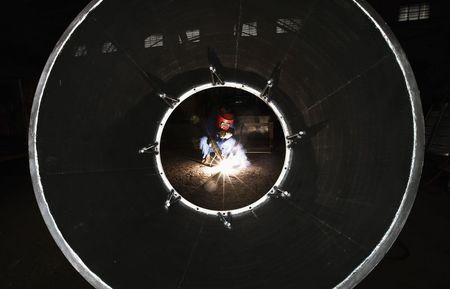By Koh Gui Qing
BEIJING (Reuters) - Growth in China's manufacturing sector held up in September but remained subdued in a sign that the world's second-largest economy is still struggling to recover its growth momentum.
The official Purchasing Managers' Index (PMI) hovered at 51.1, the National Bureau of Statistics said on Wednesday, indicating a modest expansion in activity and a touch ahead of forecasts for a 51.0 reading.
The data came a day after China cut mortgage rates for the first time since the 2008 global financial crisis to boost its flagging economy, and reinforced a view among some analysts that sluggish domestic demand and a cooling property market were dragging on activity.
"We see the risk of third-quarter gross domestic product growth slowing to 7 percent" from 7.5 percent in the second quarter, economists at ANZ Bank said in a note to clients, noting that growth in China's crude steel output fell to the year's low in the first 20 days of September.
"Weakness in the property market and rising credit risks in the commodity sector will continue to weigh on the economy," the ANZ economists said.
Unsteady - albeit strengthening - export sales, softening domestic investment and the property slowdown have all dragged China's economy through a rough year, leading investors to bet on further policy loosening by authorities to lift growth.
Wednesday's PMI survey, which is biased towards large, state-owned factories, showed that demand for goods produced by such manufacturers was stronger in China than abroad, even though the trend is softening.
The new orders sub-index, a proxy for foreign and domestic demand, stood at 52.2, down slightly from 52.5 in August but well above the 50-point mark that demarcates growth from contraction on a monthly basis.
The new export orders sub-index, on the other hand, edged up to 50.2 but stood only a whisker above 50.
"The economy still faces a degree of downward pressure," Chen Zhongtao, an official at the China Federation of Logistics and Purchasing which helps to publish the PMI, said in a statement.
"The data has only stopped falling this month and turned flat," Chen said.
SLOWER GROWTH
To arrest the economic cooldown, China's central bank and banking regulator relaxed lending rules for second-home buyers on Tuesday by giving them a 30 percent discount on mortgage rates and cutting their down payment levels to 30 percent from 60-70 percent.
But some analysts warned that a glut of unsold or unoccupied homes could temper any rebound in China's housing market, which accounts for about 15 percent of the economy. Others said it remained unclear if buyers would be persuaded by lower rates if they believed prices would continue to fall.
The sagging housing market has pushed the Chinese economy into a deeper funk in recent months as weak activity appeared to broaden across sectors.
Factory output and a broad measure of credit supply both unexpectedly fell to six-year lows in the summer. Profits at Chinese industrial firms fell 0.6 percent in August from a year ago, reversing from a near 14 percent rise the month before.
And perhaps more worrying for policymakers, who prize a healthy labour market above all else in a downturn, a separate preliminary PMI survey by HSBC/Markit that was out earlier this month showed factory employment sinking to a 5-1/2-year low in September.
Wednesday's official PMI showed factory employment shrank again in September, though the pace did not intensify, leaving the employment sub-index unchanged at 48.2.
China's government is aiming to grow the economy by around 7.5 percent in 2014, though the run of underwhelming data so far this year has led many analysts to predict that growth would fall short of that target.
Chinese policymakers have on their part maintained that no dramatic policy loosening is imminent because the country cannot rely on stubbornly loose credit conditions to bolster growth.
Yet at the same time, policymakers have taken pains to ensure monetary conditions are easy and have rolled out a series of modest support measures aimed at the most vulnerable sectors of the economy.
In September alone, the central bank disbursed 500 billion yuan (50.31 million pounds) worth of three-month loans to China's top five banks to prevent short-term interest rates from spiking before this week's Golden Week holiday. That was followed by the first cut in mortgage rates since the global financial crisis.

"We maintain our below-consensus gross domestic product growth forecasts (of) 7.2 percent in 2014 and 6.9 percent in 2015," Jian Chang and Rahul Bajoria, economists at Barclays Bank, said in a note.
(Editing by Kim Coghill)
